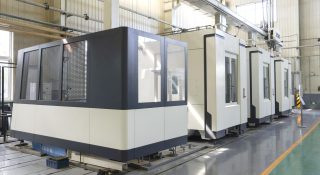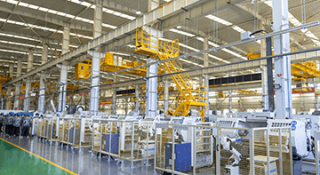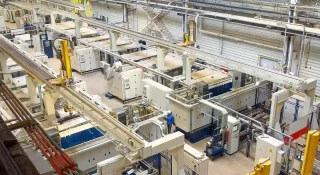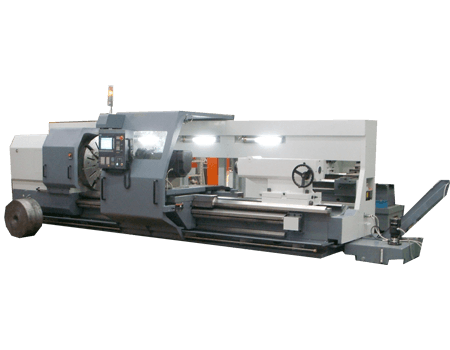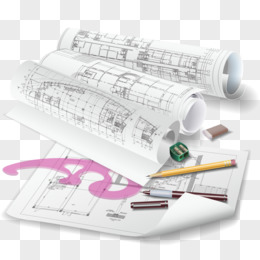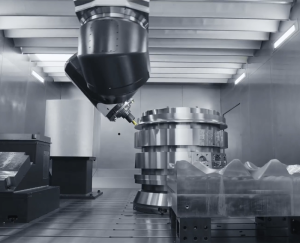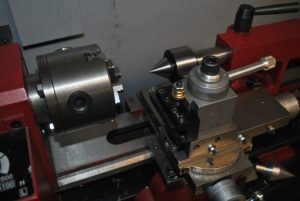Traditional manual machining is inefficient and prone to errors. CNC machine tool technology, on the other hand, can increase productivity and machining accuracy, enable mass production of complex parts, and transform the manufacturing industry. In this article, we’ll explore the fundamentals of CNC and its wide-ranging impact.
CNC (Computer Numerical Control) refers to the technology of controlling machine tools and equipment through computer programs. CNC offers greater accuracy, efficiency, and consistency than traditional manual controls. It also reduces human error and improves product quality.
Want to learn how CNC technology is transforming modern manufacturing? Discover the basics of CNC, its major applications, and its future development trends to get a comprehensive understanding of this critical technology. Keep reading to learn more about CNC!
The History of Computer Numerical Control
CNC technology was born in the mid-20th century with funding from the United States Air Force. In 1952, researchers at the Massachusetts Institute of Technology invented the first numerical control machine tool, marking the birth of CNC technology. Since then, with advances in computer technology and increasing application requirements, CNC technology has rapidly developed and been widely used in manufacturing.
What Is CNC?
CNC stands for Computer Numerical Control. It involves using computer programs to control the movements of machine tools and equipment to achieve precise machining of workpieces. Compared to traditional manual control, CNC provides higher precision, speed, and consistency, greatly improving production efficiency and product quality.
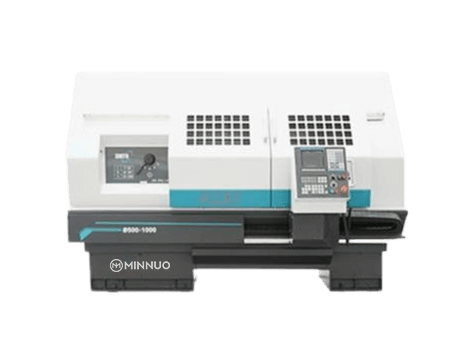
What Is CNC Machining?
CNC machining is a general term for various machining operations performed using computer numerical control technology. It covers a wide range of processes, including turning, milling, drilling, grinding, laser cutting, and electrical discharge machining (EDM). Each process has its own unique advantages and applications.
Turning: Turning involves rotating the workpiece while a cutting tool shapes it. CNC lathes precisely control the rotation speed and tool path, enabling the machining of high-precision cylindrical, conical, and complex curved parts.
Milling: Milling uses a rotating cutting tool to shape a stationary workpiece. CNC milling machines can program and control tool movements to create complex flat surfaces, slots, gears, and three-dimensional shapes.
Drilling: Drilling uses a rotating drill bit to create holes in the workpiece. CNC drilling machines can accurately position and control drilling depth, suitable for various hole diameters and depths.
Grinding: Grinding uses a high-speed rotating abrasive wheel to achieve precise finishing on workpieces. CNC grinding machines offer high surface smoothness and dimensional accuracy, making them ideal for precision parts.
Laser Cutting: Laser cutting uses a high-energy laser beam to cut and engrave workpieces. CNC laser cutting machines precisely control the laser beam’s movement path, enabling fast and accurate processing of various materials.
Electrical Discharge Machining (EDM): EDM uses electrical discharges to machine conductive materials. CNC EDM machines can create complex molds and hard alloy materials, suitable for high-hardness and high-difficulty machining tasks.
The essence of CNC machining is to program the machining paths and parameters into the numerical control system, which then controls the machine tools to perform the corresponding operations. This method not only improves machining precision and efficiency but also significantly reduces human operation errors and labor intensity.
What Are CNC Machines?
CNC machine tools are computer-controlled equipment that automatically completes machining tasks according to preset programs. Common types of CNC machine tools include CNC lathes, CNC milling machines, CNC grinders, and CNC EDM machines.
What Is a CNC Machinist?
A CNC machinist is a professional responsible for operating and maintaining CNC machine tools. They must be skilled in programming, machine tool operation, and workpiece clamping to ensure CNC machines can efficiently and accurately perform machining tasks.
How Does CNC Work
The basic components of a CNC machine tool include the controller, servo system, drive unit, and machine tool body. The numerical control system reads and interprets programming instructions, controlling the servo system and drive unit to move the machine tool body according to the predetermined path and speed.
Why Is CNC Machining Important
CNC machining is crucial in modern manufacturing. It improves production efficiency and product quality, and enables high-precision machining of complex parts, meeting the demands of various industries for high-performance and high-reliability products.
Why Are CNC Machine Tools So Efficient?
The high efficiency of CNC machine tools stems mainly from their automation and precise control. The numerical control system can quickly and accurately execute programming instructions, reducing human operation errors and time. Additionally, CNC machine tools feature multi-axis linkage capabilities, allowing simultaneous multi-process machining, significantly shortening machining cycles.
Important Applications of CNC
CNC technology is widely used across various fields. Here are some major application areas and specific examples:
Manufacturing: CNC technology is central to modern manufacturing. It is widely used in the automotive, aerospace, electronics, and household appliance industries. In automotive manufacturing, CNC machines process engine components, body structures, and transmissions. In aerospace, CNC technology is used to machine high-precision aircraft engine blades, aircraft structures, and spacecraft parts.
Medical Devices: CNC technology plays a vital role in medical device production. High-precision CNC machining can create complex medical instruments and implants, such as artificial joints, orthopedic devices, and heart stents. The high precision and consistency of CNC technology ensure the quality and safety of medical devices.
Aerospace: In the aerospace industry, CNC technology is used to manufacture various complex and high-precision parts, such as aircraft structures, engine components, and spacecraft parts. CNC machines can process high-strength and lightweight materials, meeting the aerospace industry’s strict requirements for material performance and machining accuracy.
Automotive Industry: CNC technology is widely used in the automotive industry for machining engines, transmissions, chassis, and body parts. CNC machining allows for efficient mass production and the manufacture of precision parts, improving vehicle performance and reliability.
Electronics Manufacturing: CNC technology is also important in electronics manufacturing, such as machining phone cases, computer components, and precision circuit boards. CNC machining meets the high precision requirements for small sizes in electronic products.
Mold Making: Mold making is a significant application area for CNC technology. CNC machines can create complex mold shapes, ensuring high precision and durability. The quality of molds directly affects product quality and production efficiency, and CNC technology enhances the entire manufacturing process.
Other Fields: Besides the above fields, CNC technology is widely used in shipbuilding, railway locomotives, construction machinery, precision instruments, and other industries. The efficiency, precision, and flexibility of CNC technology make it widely recognized and used in various sectors.
These application cases show that CNC technology has penetrated various industries, providing strong support for modern industry and technology development. As technology advances, the scope and depth of CNC technology applications will further expand.
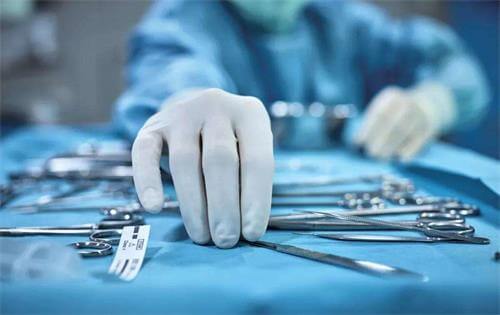
What Can CNC Machines Do?
CNC machines can do a lot of things. They can turn, mill, drill, and grind. They can machine complex shapes and high-precision parts. They can make a lot of parts quickly and they can make a few parts slowly. They can make parts for mass production and they can make parts for custom manufacturing.
Advantages and Disadvantages of CNC
Advantages:
High Precision: CNC machines can make parts to within a few microns.
High Efficiency: CNC machines can make parts quickly.
Consistency: Every part is the same.
Flexibility: You can do a lot of different things with a CNC machine.
Disadvantages:
High Cost: CNC machines and software are expensive.
Complex Maintenance: CNC machines are complicated and need a lot of attention.
Environmental Sensitivity: CNC machines don’t like dirt, dust, or temperature changes.
Future Trends in CNC
In the future, CNC will be part of smart manufacturing and Industry 4.0. CNC machines will be connected to the internet and will use big data and artificial intelligence to make themselves better. They will make parts faster and better. They will be part of green manufacturing and sustainable development.
Conclusion
CNC is a big deal. It makes things better, faster, and cheaper. It makes things that couldn’t be made before. It makes things that are better than things made any other way. It makes things that are better for people and better for the planet. CNC is part of the future of making things.
Frequently Asked Questions (FAQ)
What are the main parts of a CNC machine?
The main parts of a CNC machine are the controller, the servos, the drives, and the machine.
What kind of programming languages are used for CNC?
The most common programming languages for CNC are G-code and M-code.
What are the most common types of CNC machines?
The most common types of CNC machines are CNC lathes, CNC mills, CNC grinders, and CNC EDM machines.


